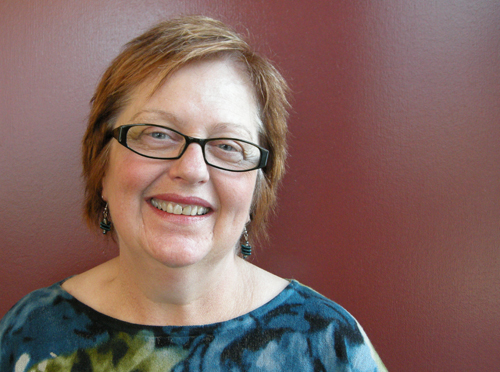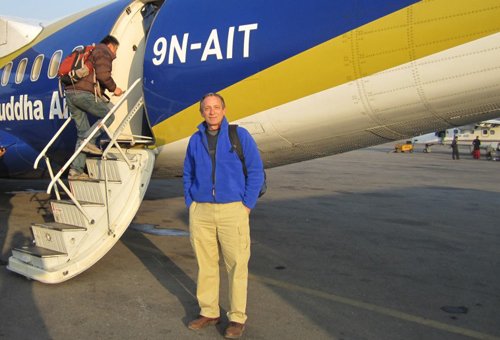
“The traffic in Accra makes the 401 look like an amateur rush hour,” says history professor Jacqueline Murray. “The taxi drivers are yelling and honking and driving onto the shoulder. One drove me into a vacant lot only to discover the egress was blocked by a bonfire, so he took a run at the ditch, and where we ended up was definitely not a road.” Was she scared? “Not really. I felt like ‘this is Accra, this is wonderful.’” Wonderful or not, Murray didn’t ride with that particular taxi driver again.
She was in Accra, the capital city of Ghana, for three weeks as part of the Leave for Change program. Murray says she’s the one who was changed: “You can’t have an experience like this and come back the same person.”
The University of Guelph participates in Leave for Change by supporting staff and faculty who, like Murray, are willing to devote some of their vacation time to volunteer in developing countries. Organizations with specific needs advertise with Uniterra, a joint initiative of World University Service of Canada and the Centre for International Studies and Co-operation. U of G volunteers can search these opportunities then apply through the Department of Human Resources.
Murray was delighted to find a need for her skills; she was assigned to translate legislation about the rights of children into plain English so that the Ghanian NGO Childs Rights International could use the documents in its work. Murray ended up doing two versions, one for older children and one intended to be illustrated with cartoons for use with younger children. “I never worked such long days or felt so good about them,” she says.
Her time in Africa gave her a new perspective: “Many people in Ghana are very poor, poorer than I’d ever seen, but everyone is dressed in clean, clean clothes, and they take great pride in their appearance. They are also very proud of their country and their democracy, and they work hard to get ahead. Spending time there completely explodes our North American stereotypes about the conditions and values of people in the developing world.
“We tend to imagine it’s nothing but slums and squalor and indolence − people waiting around for us to feed them. The people of Ghana work hard and take pride in what they do. They’re also part of the global community; they know what’s going on. They all have cell phones. Even the cleaner from my hotel has a cell phone and sends me texts. I don’t want to underplay the poverty, but that’s not all there is.”
Another recent Leave for Change volunteer, Linda Watt, who is director of learning and development and consulting services at U of G, travelled to Lilongwe, Malawi, to take on a volunteer position with the local ministry of education. Her favourite day was when she and a colleague went to visit a rural school that was part of the Homegrown School Feeding Program. As Watt explains, this initiative supports schools in growing maize and soya plants. “This maize and soya are then harvested, made into a porridge-like meal and used to feed the children who are enrolled, so that every child has at least one good meal a day.”
That’s important because one-third of the children attending school in Malawi can’t count on one meal a day. Another third have one meal most days, but not reliably, and the final third have up to two meals daily. The promise of a daily meal has attracted more students to the schools participating in the program.

For plant pathology professor Greg Boland, the Leave for Change opportunity seemed perfectly suited to his interests and expertise. He travelled for 35 hours to reach Nepal and work with the Nepal Agriculture Cooperative Central Federation Ltd. “I spent some of my time in the capital city of Kathmandu and the rest in small villages,” he says.
The people in the villages built narrow terraces on the surrounding hillsides. These were ploughed with teams of oxen, then hoed and dug by hand, planted by hand, and harvested by hand. There were no weeds, Boland says, because the farm families went out each day and pulled up weeds and trimmed the grasses growing on the sides of the terraces. “The weeds and grass were put in a basket and carried back to feed the family’s goats and chickens. Nothing went to waste,” he adds.
Because many of the crops planted by the Nepal farmers in this area were from the same botanical family − broccoli, cauliflower, cabbage and Chinese radishes − they were often susceptible to the same diseases, and one called “club root” was a common problem. Boland says the farmers were very knowledgeable and skilled, but also interested in any knowledge he had to share. He’d walk out to a farm with an interpreter and soon have 30 or more farmers gathered around to join in the discussion. “And it was a discussion, not a lecture,” he adds. “We would talk about the problems, and I’d share some of my information, but they would all contribute from their experience and knowledge. The idea was to find strategies and solutions that would be practical and realistic in their situation.”
At the end of his visit, he wrote a report with suggestions for the cooperative, the local farmers and the government. One suggestion was based on something he’d discovered during a conversation with another volunteer working with the dairy industry in a different community. Boland knew that adding lime to the soil was an effective treatment for “club root,” but the farmers found it hard to get high-quality lime. However, the other volunteer mentioned that the government had an agreement with local cement companies to provide lime for dairy farmers; Boland hopes a similar agreement could help the farms he saw.
Boland also had a chance to fly past Mount Everest, get to know some of the local people and deal with the challenges of electrical shortages in Kathmandu. More details of his experiences are on his blog. “Nepal is one of the ten poorest countries in the world,” he says, “but the people are respectful, happy, and positive. I was impressed to see how they had organized themselves for their own betterment.”
He adds that he was also impressed with the Leave for Change program itself. “We were well-prepared and well-supported. It’s a highly professional organization that gives you a chance to make a real difference even in a short time.”
Boland, Watt and Murray were among seven U of G employees who participated in Leave for Change last year. Julia Baldwin, a recruitment officer in the College of Physical and Engineering Science; Susan Bennett, director of university and community relations; and Prof. Judi McCuaig, Computing and Information Science, also worked in Ghana. Nancy Schmidt, Office of the Associate Vice-President Academic, travelled to Vietnam.
To date, the University has sponsored 24 volunteers; 2011 applications were sent to Uniterra in March.
For more information about Leave for Change, visit the website or contact Annette Boodram, manager of human resources planning at Ext. 56495.
.